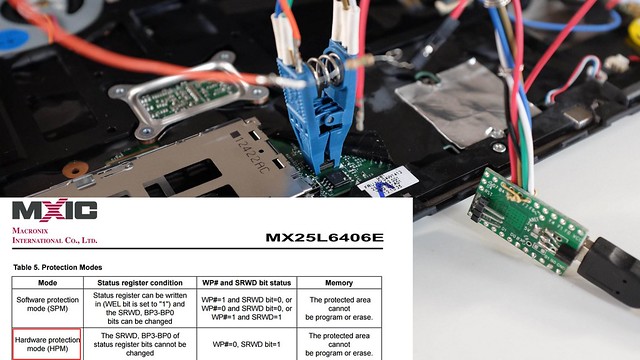removes a comment: -# CONFIG_DASHARO_FIRMWARE_UPDATE_MODE is not set - Unify ns50/nv41 - CONFIG_TPM_PIRQ=0x27 in both nv41/ns50 as per https://github.com/linuxboot/heads/pull/1662#issuecomment-2100820944 NOTE that this doesn't stick when calling make[1]: Leaving directory '/home/user/heads/build/x86/coreboot-dasharo' user@heads-tests-deb12:~/heads$ git diff diff --git a/config/coreboot-nitropad-nv41.config b/config/coreboot-nitropad-nv41.config index 9484aaf5122..ddd4e5d7c56 100644 --- a/config/coreboot-nitropad-nv41.config +++ b/config/coreboot-nitropad-nv41.config @@ -143,7 +143,7 @@ CONFIG_BOARD_CLEVO_NV40PZ_BASE=y CONFIG_MAINBOARD_SMBIOS_PRODUCT_NAME="Nitropad NV41" CONFIG_CONSOLE_POST=y # CONFIG_USE_PM_ACPI_TIMER is not set -CONFIG_TPM_PIRQ=0x27 +CONFIG_TPM_PIRQ=0x0 # CONFIG_SOC_INTEL_CSE_SEND_EOP_EARLY is not set CONFIG_VBOOT_FWID_VERSION="$(CONFIG_LOCALVERSION)" CONFIG_EC_SYSTEM76_EC_BAT_THRESHOLDS=y Also note that CONFIG_EC_SYSTEM76_EC_DGPU=y is not present on ns50 as opposed to nv41, whatever that does. user@heads-tests-deb12:~/heads$ diff -u config/coreboot-nitropad-nv41.config config/coreboot-nitropad-ns50.config --- config/coreboot-nitropad-nv41.config 2024-05-10 14:59:42.156754718 -0400 +++ config/coreboot-nitropad-ns50.config 2024-05-10 14:55:37.699761391 -0400 @@ -110,7 +110,7 @@ # CONFIG_VENDOR_TI is not set # CONFIG_VENDOR_UP is not set CONFIG_MAINBOARD_FAMILY="Not Applicable" -CONFIG_MAINBOARD_PART_NUMBER="nv40pz" +CONFIG_MAINBOARD_PART_NUMBER="ns50pu" CONFIG_MAINBOARD_VERSION="v2.1" CONFIG_MAINBOARD_DIR="clevo/adl-p" CONFIG_DIMM_MAX=4 @@ -128,7 +128,7 @@ CONFIG_DEVICETREE="devicetree.cb" # CONFIG_VBOOT is not set CONFIG_VBOOT_VBNV_OFFSET=0x28 -CONFIG_VARIANT_DIR="nv40pz" +CONFIG_VARIANT_DIR="ns50pu" CONFIG_OVERRIDE_DEVICETREE="variants/$(CONFIG_VARIANT_DIR)/overridetree.cb" # CONFIG_VGA_BIOS is not set CONFIG_MAINBOARD_SMBIOS_MANUFACTURER="Nitrokey" @@ -139,8 +139,8 @@ CONFIG_CMOS_LAYOUT_FILE="src/mainboard/$(MAINBOARDDIR)/cmos.layout" CONFIG_BOOT_DEVICE_SPI_FLASH_BUS=0 CONFIG_BOARD_CLEVO_ADLP_COMMON=y -CONFIG_BOARD_CLEVO_NV40PZ_BASE=y -CONFIG_MAINBOARD_SMBIOS_PRODUCT_NAME="Nitropad NV41" +CONFIG_BOARD_CLEVO_NS50PU_BASE=y +CONFIG_MAINBOARD_SMBIOS_PRODUCT_NAME="Nitropad NS51" CONFIG_CONSOLE_POST=y # CONFIG_USE_PM_ACPI_TIMER is not set CONFIG_TPM_PIRQ=0x27 @@ -158,8 +158,8 @@ CONFIG_HAVE_INTEL_FIRMWARE=y CONFIG_MRC_SETTINGS_CACHE_SIZE=0x10000 CONFIG_DRIVERS_INTEL_WIFI=y -CONFIG_IFD_BIN_PATH="3rdparty/dasharo-blobs/novacustom/nv4x_adl/descriptor.bin" -CONFIG_ME_BIN_PATH="3rdparty/dasharo-blobs/novacustom/nv4x_adl/me.bin" +CONFIG_IFD_BIN_PATH="3rdparty/dasharo-blobs/novacustom/ns5x_adl/descriptor.bin" +CONFIG_ME_BIN_PATH="3rdparty/dasharo-blobs/novacustom/ns5x_adl/me.bin" CONFIG_CONSOLE_CBMEM_BUFFER_SIZE=0x20000 CONFIG_VBT_DATA_SIZE_KB=9 CONFIG_CARDBUS_PLUGIN_SUPPORT=y @@ -176,8 +176,8 @@ # # Alder Lake P (2022) # -# CONFIG_BOARD_NOVACUSTOM_NS5X_ADLP is not set -CONFIG_BOARD_NOVACUSTOM_NV4X_ADLP=y +CONFIG_BOARD_NOVACUSTOM_NS5X_ADLP=y +# CONFIG_BOARD_NOVACUSTOM_NV4X_ADLP is not set # # Tiger Lake U (2021) @@ -503,7 +503,6 @@ # CONFIG_EC_ACPI=y CONFIG_EC_SYSTEM76_EC=y -CONFIG_EC_SYSTEM76_EC_DGPU=y # # Intel Firmware Signed-off-by: Thierry Laurion <insurgo@riseup.net>
Heads: the other side of TAILS
Heads is a configuration for laptops and servers that tries to bring more security to commodity hardware. Among its goals are:
- Use free software on the boot path
- Move the root of trust into hardware (or at least the ROM bootblock)
- Measure and attest to the state of the firmware
- Measure and verify all filesystems
NOTE: It is a work in progress and not yet ready for non-technical users. If you're interested in contributing, please get in touch. Installation requires disassembly of your laptop or server, external SPI flash programmers, possible risk of destruction and significant frustration.
More information is available in the 33C3 presentation of building "Slightly more secure systems".
Documentation
Please refer to Heads-wiki for your Heads' documentation needs.
Building heads
make BOARD=board_name where board_name is the name of the board directory under ./boards directory.
In order to build reproducible firmware images, Heads builds a specific
version of gcc and uses it to compile the Linux kernel and various tools
that go into the initrd. Unfortunately this means the first step is a
little slow since it will clone the musl-cross-make tree and build gcc...
Once that is done, the top level Makefile will handle most of the
remaining details -- it downloads the various packages, verifies the
hashes, applies Heads specific patches, configures and builds them
with the cross compiler, and then copies the necessary parts into
the initrd directory.
There are still dependencies on the build system's coreutils in
/bin and /usr/bin/, but any problems should be detectable if you
end up with a different hash than the official builds.
The various components that are downloaded are in the ./modules
directory and include:
We also recommend installing Qubes OS,
although there Heads can kexec into any Linux or
multiboot
kernel.
Notes:
- Building coreboot's cross compilers can take a while. Luckily this is only done once.
- Builds are finally reproducible! The reproduciblebuilds tag tracks any regressions.
- Currently only tested in QEMU, the Thinkpad x230, Librem series and the Chell Chromebook. ** Xen does not work in QEMU. Signing, HOTP, and TOTP do work; see below.
- Building for the Lenovo X220 requires binary blobs to be placed in the blobs/x220/ folder. See the readme.md file in that folder
- Building for the Librem 13 v2/v3 or Librem 15 v3/v4 requires binary blobs to be placed in the blobs/librem_skl folder. See the readme.md file in that folder
QEMU:
OS booting can be tested in QEMU using a software TPM. HOTP can be tested by forwarding a USB token from the host to the guest.
For more information and setup instructions, refer to the qemu documentation.
coreboot console messages
The coreboot console messages are stored in the CBMEM region
and can be read by the Linux payload with the cbmem --console | less
command. There is lots of interesting data about the state of the
system.

